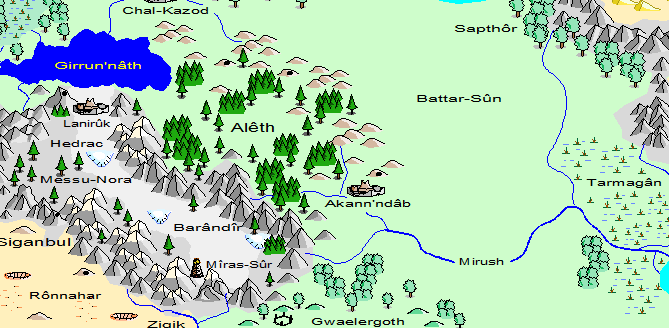
| Category | Ruins |
| Continent | Karterus |
| Region | Gulimbor |
| Founded | 19 Bloom 412 LE |
| Map | Marninnoth |
Akann'ndâb was founded by Llebres trappers. When the Hive Swarms ravaged Llebres and other holds around Klak-tak, it became a refugee camp and then a permanent settlement. By the Horgon Era, the city's mostly Khazarkar population, controlled an area from Alêth to Gwaelergoth and east to the coasts.
In the First Epoch, facing growing conflict with the Tragaran peoples of the Hedrac Valley, and those pushing down the Imrabêl led to a rise in nationalism. It was a a time when powerful and wealthy families, in many key positions in government and business, joined together to form a new ruling class of families, the city-state's first monarchy. The Belkazim's, of the Kingdom of Belkazim ruled from this city until the capital was moved to Athânâlo.
When Akann'ndâb became part of the First Khazarkar Empire, it was the heart of religious worship. By the start of the Second Epoch, the Church of Kebechet was the city's strongest religion. In the Domination Wars (995 - 1016), looking for allies, the Church of Kebechet forged an alliance with the Church of Set. Looking to usurp the Eldritch Conclave in 1002, they were defeated. From the evergreens of Alêth, they watched their city burn, overrun by the Conclave's magical monsters.
Akann'ndâb was once a beautiful place, employing artisans from many races to beautify the place. The central plateau with its sprawling streets meandered down terraced slopes. Magically drawn water from the top of the plateau passed through canals, into ponds, and over waterfalls. The landscaping was such that all this seemed natural. Streets of the city were very wide, allowing easy movement of the crack Elephantan Guard to any part of the city. Today, the water has stopped flowing, and weeds cover the streets and canals. The place is rubble-strewn, with no building escaping the ravages of war. The Eldritch Conclave guardians city still reside here. There are no less than fifty grave dirt golems lurking about the ruins.
Related Information
Notable Areas
- Impregnable Edifice
- Inverted Throne
- Miruk-Nalbêth
- Ulbândâk, palace of the first royal family (c.f. Belkazim) of the khazarkars